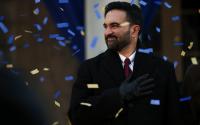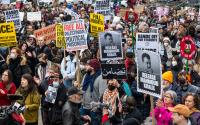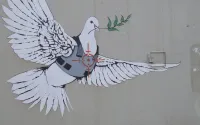16 September 2004 Znet / New Statesman;
The world is dividing into two hostile camps: Islam and "us". That is the unerring message from western governments, press, radio and television. For Islam, read terrorists. It is reminiscent of the cold war, when the world was divided between "Reds" and us, and even a strategy of annihilation was permissible in our defence. We now know, or we ought to know, that so much of that was a charade; released official files make clear the Soviet threat was for public consumption only.
Every day now, as during the cold war, a one-way moral mirror is held up to us as a true reflection of events. The new threat is given impetus with every terrorist outrage, be it at Beslan or Jakarta. Seen in the one-way mirror, our leaders make grievous mistakes, but their good intentions are not in question. Tony Blair's "idealism" and "decency" are promoted by his accredited mainstream detractors, as the concocted Greek tragedy of his political demise opens on the media stage. Having taken part in the killing of as many as 37,000 Iraqi civilians, Blair's distractions, not his victims, are news: from his arcane rivalry with treasurer Gordon Brown, his Tweedledee, to his damascene conversion to the perils of global warming. On the atrocity at Beslan, Blair is allowed to say, without irony or challenge, that "this international terrorism will not prevail". These are the same words spoken by Mussolini soon after he had bombed civilians in Abyssinia.
Heretics who look behind the one-way mirror and see the utter dishonesty of all this, who identify Blair and his collaborators as war criminals in the literal and legal sense and present evidence of his cynicism and immorality, are few; but they have wide support among the public, whose awareness has never been higher, in my experience. It is the British public's passionate indifference, if not contempt for the political games of Blair/Brown and their courts and its accelerating interest in the way the world really is, that unnerves those with power.
Let's look at a few examples of the way the world is presented and the way it really is. The occupation of Iraq is presented as "a mess": a blundering, incompetent American military up against Islamic fanatics. In truth, the occupation is a systematic, murderous assault on a civilian population by a corrupt American officer class, given licence by its superiors in Washington. Last May, the US Marines used battle tanks and helicopter gunships to attack the slums of Fallujah. They admitted killing 600 people, a figure far greater than the total number of civilians killed by the "insurgents" during the past year. The generals were candid; this futile slaughter was an act of revenge for the killing of three American mercenaries. Sixty years earlier, the SS Das Reich division killed 600 French civilians at Oradour-sur-Glane as revenge for the kidnapping of a German officer by the resistance. Is there a difference?
These days, the Americans routinely fire missiles into Falluja and other dense urban areas; they murder whole families. If the word terrorism has any modern application, it is this industrial state terrorism. The British have a different style. There are more than 40 known cases of Iraqis having died at the hands of British soldiers; just one soldier has been charged. In the current issue of the magagazine The Journalist, Lee Gordon, a freelance reporter, wrote, "Working as a Brit in Iraq is hazardous, particularly in the south where our troops have a reputation (unreported at home) for brutality." Neither is the growing disaffection among British troops reported at home. This is so worrying the Ministry of Defence that it has moved to placate the family of 17-year-old soldier David McBride by taking him off the AWL list after he refused to fight in Iraq. Almost all the families of soldiers killed in Iraq have denounced the occupation and Blair, all of which is unprecedented.
Only by recognising the terrorism of states is it possible to understand, and deal with, acts of terrorism by groups and individuals which, however horrific, are tiny by comparison. Moreover, their source is inevitably the official terrorism for which there is no media language. Thus, the State of Israel has been able to convince many outsiders that it is merely a victim of terrorism when, in fact, its own unrelenting, planned terrorism is the cause of the infamous retaliation by Palestinian suicide bombers. For all of Israel's perverse rage against the BBC - a successful form of intimidation - BBC reporters never report Israelis as terrorists: that term belongs exclusively to Palestinians imprisoned in their own land. It is not surprising, as the recent Glasgow University study concluded, that many television viewers in Britain believe that the Palestinians are the invaders and occupiers.
On 7 September, a Palestinian suicide bomber killed 16 Israelis in the town of Beersheba. Every television news report allowed the Israeli government spokesman to use this tragedy to justify the building of an apartheid wall - when the wall is pivotal to the causes of Palestinian violence. Almost every news report marked the end of a five-month period of "relative peace and calm" and "a lull in the violence". During those five months of relative peace and calm, almost 400 Palestinians were killed, 71 of them in assassinations. During the lull in the violence, more than 73 Palestinian children were killed. A 13 year old was murdered with a bullet through the heart, a five year old was shot in her face as she walked arm in arm with her two-year-old sister. The body of Mazen Majid, aged 14, was riddled with 18 Israeli bullets as he and his family fled their bulldozed home.
None of this was reported in Britain as terrorism. Most of it was not reported at all. After all, this was a period of peace and calm, a lull in the violence. On 19 May, Israeli tanks and helicopters fired on peaceful demonstrators, killing eight of them. This atrocity had a certain significance; the demonstration was part of a growing non-violent Palestinian movement, which has seen peaceful protest gatherings, often with prayers, along the apartheid wall. The rise of this Gandhian movement is barely noted in the outside world.
The truth about Chechyna is similarly suppressed. On 4 February 2000, Russian aircraft attacked the Chechen village of Katyr Yurt. They used "vacuum bombs", which release petrol vapour and suck people's lungs out, and are banned under the Geneva Convention. The Russians bombed a convoy of survivors under a white flag. They murdered 363 men, women and children. It was one of countless, little known acts of terrorism in Chechnya perpetrated by the Russian state, whose leader, Vladimir Putin, has the "complete solidarity" of Tony Blair.
"Few of us", wrote the playwright Arthur Miller, "can easily surrender our belief that society must somehow make sense. The thought that the state has lost its mind and is punishing so many innocent people is intolerable. And so the evidence has to be internally denied."
It is time we stopped denying it.
John Pilger's new book, Tell Me No Lies: investigative journalism and its triumphs, is published by Jonathan Cape next month






